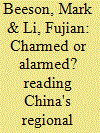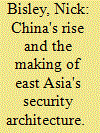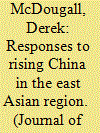|
|
|
Sort Order |
|
|
|
Items / Page
|
|
|
|
|
|
|
| Srl | Item |
| 1 |
ID:
110070


|
|
|
|
|
| Publication |
2012.
|
| Summary/Abstract |
China has rapidly re-emerged as a major regional power in East Asia. Although this represents a return to a long-established historical pattern, the ability of China's political elites to reassure nervous neighbours about the implications of its rise will be a major test of its evolving and increasingly sophisticated foreign policies. In this paper we focus primarily on China's regional engagement strategies, detailing the way such initiatives are understood in China, and the way they are received elsewhere. We focus primarily on the political and economic impacts of China's policies, and briefly consider their reception in Northeast Asia and Southeast Asia. We highlight the different dynamics and issues that China's policymakers must consider in each area, and suggest that despite some difficulties and tensions, on balance, China's policies are proving surprisingly effective.
|
|
|
|
|
|
|
|
|
|
|
|
|
|
|
|
| 2 |
ID:
110069


|
|
|
|
|
| Publication |
2012.
|
| Summary/Abstract |
This article examines the recent growth in multilateral security processes, the efforts to forge a 'security architecture', and focuses particularly on the role that China's rise has played in this process. It sketches out growth in Asian security cooperation and the efforts to forge a new security architecture. It then considers the question of China as a cause of this increase in security cooperation as well as China's own motives in actively engaging with this process. The final section then reflects on the contribution that security cooperation currently makes to the regional order. The article argues that China's rise has been an important prompt to the efforts to devise new security arrangements, but has not been the only source of this trend. It concludes that while multilateral security cooperation will be important in the emerging regional order, alone it will not provide a robust foundation for regional stability and security.
|
|
|
|
|
|
|
|
|
|
|
|
|
|
|
|
| 3 |
ID:
110076


|
|
|
|
|
| Publication |
2012.
|
| Summary/Abstract |
Why do large domestic and multinational enterprises choose one Chinese city over the others in which to set up their company headquarters? What could the Chinese local governments do in order to attract enterprises to establish headquarters in their localities? Following the Chinese commonly used term 'headquarter economy' and investigating the issue mostly from the local governments' perspective, this research examines two cases, Pudong and Shenzhen, to see how they have capitalized on their local advantages and attracted different types of large investments. Both the Pudong and Shenzhen governments provide preferential policies and administrative reforms to build a good investment environment and to develop a 'headquarter economy'. Their preferential policies are similar in design but different in content, so as to attract different target investors. Their administrative reforms are similar in direction but with variations in pace and design for implementation. Our conclusion shows that 'headquarter economy' is a concept flexibly used and wisely adopted by Chinese local governments to develop local economies.
|
|
|
|
|
|
|
|
|
|
|
|
|
|
|
|
| 4 |
ID:
110074


|
|
|
|
|
| Publication |
2012.
|
| Summary/Abstract |
In the early nineteenth century a 'great divergence' occurred that bifurcated civilizations into East and West, sending the former into descent. Since the 1950s, however, the economic growth of East Asia has been nothing short of remarkable. This development has led some scholars, such as Giovanni Arrighi and the colleagues of Takeshi Hamashita, to optimistically suggest the resurgence of East Asia in general and the re-centering of China in particular, a line of reasoning that appears to draw on memories of the China-centered tributary trade system defining the region for centuries. For these scholars, the rise of East Asia after 1950 can be seen as a reversal of the great divergence. We challenge this view. Data show that China has yet to prepare for the new knowledge-based economy. Furthermore, we raise the possibility that Japan may move farther away from, rather than closer to, the traditional center of China in the twenty-first-century East Asian interstate system.
|
|
|
|
|
|
|
|
|
|
|
|
|
|
|
|
| 5 |
ID:
110072


|
|
|
|
|
| Publication |
2012.
|
| Summary/Abstract |
As China expands its development assistance in Southeast Asia, is Chinese aid beginning to emulate international norms and practices or sustaining its own distinct approach to development assistance? This essay argues that China's socialization into international norms varies with the thickness of the institutional environment. In Laos and Cambodia, China's enhanced collaboration with international consortia, improved transparency, and project diversity point to nascent socialization. China's aid to Myanmar, however, remains opaque and largely self-interested. At the regional level, Beijing is bolstering its influence over the norms and practices of regional developmental institutions.
|
|
|
|
|
|
|
|
|
|
|
|
|
|
|
|
| 6 |
ID:
110071


|
|
|
|
|
| Publication |
2012.
|
| Summary/Abstract |
In the context of the rise of China, Southeast Asian countries and Australia have begun shifting towards an accommodation policy. Robert Ross examines the accommodation policy in South Korea, Mochizuki discusses Japanese accommodationists, and Manicom and O'Neil show some evidence of Australian accommodation of Chinese strategic preferences. The scholarship has, however, narrowly focused on and overestimated the role of security. Through a study of the origin, process, structural conditions and impacts of accommodation policy, this paper broadens the concept of accommodation to capture its multiple meanings and practices. It finds that a selective accommodation policy and strategy toward the rise of China developed in Australia is a sign of the changing power relations under which the mainstream paradigms of containment and engagement, hard balancing or bandwagoning, have proved inadequate to the task of dealing with China, and that economic interdependence has driven the politics of accommodation in Australia and several Asian countries.
|
|
|
|
|
|
|
|
|
|
|
|
|
|
|
|
| 7 |
ID:
110068


|
|
|
|
|
| Publication |
2012.
|
| Summary/Abstract |
While the strategic response to 'rising China' in the broader East Asian region has been varied, the strongest emphasis has been on 'soft balancing'. This approach is clearly evident in the strategies pursued by the most significant of the major powers, the United States, Japan and India, as well as by other powers such as Australia, Indonesia and Vietnam. However, other responses such as accommodation and hedging have also featured for various states within the region. Frequently the response of a particular state will involve a number of elements. Soft balancing is most prominent in relation to the security dimension. Economic interaction encourages other kinds of responses. Whatever the overall approach adopted, a key factor is domestic politics, particularly the perceptions of the relevant elites.
|
|
|
|
|
|
|
|
|
|
|
|
|
|
|
|
| 8 |
ID:
110073


|
|
|
|
|
| Publication |
2012.
|
| Summary/Abstract |
This paper investigates the role that children play in the migration decisions of Chinese women. The presence of children of various ages is hypothesized to affect the timing of migration, the length of migration, and the nature of migration in terms of who goes along. In addition, we also investigate whether the sex of the children affects migration decisions. Results indicate that whether one's husband ever migrated has a positive effect on migrating before childbirth. Return timing is strongly linked to the age of the child. Many mothers return to rural areas around the time that the child begins formal schooling. We also find that women who have given birth to a boy are significantly less likely to migrate after childbirth but more likely to take the boy with her if she does migrate.
|
|
|
|
|
|
|
|
|
|
|
|
|
|
|
|
| 9 |
ID:
110075


|
|
|
|
|
| Publication |
2012.
|
| Summary/Abstract |
The central government's pouring of money into the Tibetan Autonomous Region (TAR) or other Tibetan autonomous areas is apparently not really easing the tension in these regions. In response to Western criticism of the Chinese government policy in Tibet, President Hu Jintao says that the Tibetan problem is not about ethnicity, religion, or human rights, but about national unity or integrity. In fact, the Tibetan problem is about all of these things, and they are intertwined with one another. This paper attempts to understand each of them from an institutionalist perspective and to see in what way such an understanding of the problems may help solve them. Specifically, I first explain new institutionalism. Then I analyze the following problems from mainly a sociological new institutionalist perspective: (1) sovereignty and autonomy; (2) ethnicity and human rights; and (3) culture and religion. Finally I look at the possibility of social change under the institutionalist constraints. It is true that much research has been done on the Tibetan issue and the solution of it, but rarely do we see an institutionalist analysis. I hope that such an analysis will shed light on the understanding of the problem and help avoid the scene we see in the quote at the start of this paper.
|
|
|
|
|
|
|
|
|
|
|
|
|
|
|
|
|
|
|
|
|